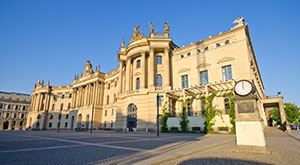Postdoctoral Job Application Guide
What is required?
When applying for a postdoc or other research position in a company, university or research institute in Germany you will generally be asked to provide the following:
- An official application form – usually downloadable from the organisation’s website. Application forms vary depending on the job but you may be required to include a detailed summary of your research interests. For applications for funding you will be required to submit a full research proposal and breakdown of how the funds will be used.
- A CV and cover (or motivation) letter.
- A copy of your degree certificates (Bachelors, Masters and Doctorate). If you get the advertised job you will need to have your qualifications officially recognised in order to begin work in Germany. To find out more consult the Recognition in Germany
- A list of your published work.
- Letter of recommendation or information about references.
- Proof of language ability (if your first language is not German or English)
Once your application has been submitted it will be scrutinised by a committee. If you are shortlisted, you may be invited to a personal interview in Germany or over the telephone.
What language?
Depending on your field and the organisation you are applying to, there should be no problem in completing your application in English. If you are a proficient German speaker, then you can write your application and CV in German, however if you lack confidence in writing in formal German, it’s best to stick to English. Most Germans speak a good level of English and the use of the language - particularly within STEM fields - is actively encouraged.
If knowledge of German is required, particularly for funding applications, you will need to prove you have attained a certain standard through recognised qualifications, such as the Test Deutsch als Fremdsprache (TestDaF). If English is not your first language you may need to include proof of your ability in the language through either International English Language Testing System (IELTS) or Teaching of English as a Foreign Language (TOEFL) qualifications.
CV and Cover Letter
A German Curriculum Vitae (Lebenslauf) doesn’t look so different from those of other countries. However, there are a few subtle changes you should be aware of when writing your CV. By formatting your CV in the German style, you will show that you understand German formalities and your application will be more carefully considered.
CV Layout
German employers value a direct and factual explanation of experience and qualifications. Your CV should be viewed as a type of ‘factsheet’ rather than including flowery statements about your outlook and motivations. Your CV should never be more than two pages long and be in tabular format, with the following headings on the left and dates and information on the right:
- Personal Details: (personaliche Angaben) – state your Title, first and last name, place and date of birth, marital status, nationality and contact details. Many foreigners may be surprised at the inclusion of marital status and date of birth but this is accepted practice in Germany.
- Education and Qualifications (Ausbildung): This section should come before work experience on a research CV. Outline your dates of attendance, the university or institution, your specific areas of research and the awarded qualification. This list should be in reverse chronological order and should go back as far as your secondary school/high school diploma or equivalent qualifications.
- Professional Experience (Berufliche Erfahrung): A reverse chronological list of any work experience or research jobs you have held. Make sure the jobs are relevant to the post (don’t include details about summer bar work!).
- Scholarships – Give details about any scholarships/funding you have received and the awarding organisation and dates.
- Skills (Sontiges): Give details about any specialist language, computing or technical skills you have acquired, plus dates and any qualifications or certificates.
- Photograph: You should always include a passport-sized photograph of yourself in the top right corner. This is not standard practice in other countries but German employers like to have a photograph so they can be prepared when they meet you.
Cover letter
Your cover letter should be an introduction to your experience and qualifications in a concise and direct style. Be clear, objective and persuasive about your research goals and why you wish to achieve them with this particular organisation. Summarise your qualifications and research experience, highlighting outstanding achievements, particularly those that fit with the organisation’s research emphasis. Be positive and use short and concise sentences without abbreviations. Never make your cover letter more than one-page long.
Application Tips
Here you will find five tips to help your application stand out, given to us by postdocs already working in Germany:
- Include a personal letter of recommendation. The letter can be from your PhD supervisor or another academic who understands your research goals and knows you as a person. Having a publication in your name would also be a major advantage.
- Show that you understand the German research landscape. Research funding options and what challenges you will face as an international postdoc. Ensure you know what visa requirements you need to apply for and how and where you will live, particularly if you have children.
- Stick to the facts. Try to avoid buzzwords and phrases. German employers will be looking for outstanding PhD qualifications and experience above anything else. So it’s best not to distract with a long list of why you are best for the job.
- Research the organisation in detail. Understand fully the organisation’s ethos, facts and figures. It’s a good idea to contact as many people who are linked to the organisation as you can beforehand for advice and information.
- Learn German: Although being able to speak German is not a pre-requisite to working in a research role in Germany, showing that you are already learning the language (by attending a course) will give you the edge on the competition.
Max Saved Jobs Reached
A maximum of 500 Saved Jobs can be created against your account. Please remove an existing Saved Job in order to add a new Saved Job.
Manage Saved Jobs








